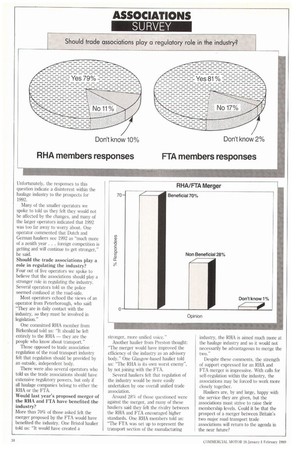ASSOCIATIONS SURVEY
Page 36

If you've noticed an error in this article please click here to report it so we can fix it.
Unfortunately, the responses to this question indicate a disinterest within the haulage industry to the prospects for 1992.
Many of the smaller operators we spoke to told us they felt they would not be affected by the changes, and many of the larger operators indicated that 1992 was too far away to worry about. One operator commented that Dutch and German hauliers see 1992 as "much more of a zenith year. . . foreign competition is getting and will continue to get stronger," he said.
Should the trade associations play a role in regulating the industry? Four out of five operators we spoke to believe that the associations should play a stronger role in regulating the industry. Several operators told us the police seemed confused at the road-side.
Most operators echoed the views of an operator from Peterborough, who said: "They are in daily contact with the industry, so they must be involved in Legislation."
One committed RHA member from Birkenhead told us: "It should be left entirely to the RHA — they are the people who know about transport."
Those opposed to trade association regulation of the road transport industry felt that regulation should be provided by an outside, independent body.
There were also several operators who told us the trade associations should have extensive regulatory powers, but only if all haulage companies belong to either the RHA or the FTA.
Would last year's proposed merger of the TWA and ETA have benefited the industry?
More than 70% of those asked felt the merger proposed by the FTA would have benefited the industry. One Bristol haulier told us: It would have created a stronger, more unified voice."
Another haulier from Preston thought: "The merger would have improved the efficiency of the industry as an advisory body." One Glasgow-based haulier told us: "The RHA is its own worst enemy", by not joining with the ETA.
Several hauliers felt that regulation of the industry would be more easily undertaken by one overall unified trade association.
Around 28% of those questioned were against the merger, and many of these hauliers said they felt the rivalry between the RHA and ETA encouraged higher standards. One RHA members told us: "The ETA was set up to represent the transport section of the manufacturing industry, the RHA is aimed much more at the haulage industry and so it would not necessarily be advantageous to merge the two."
Despite these conunents, the strength of support expressed for an RHA and ETA merger is impressive. With calls for self-regulation within the industry, the associations may be forced to work more closely together.
Hauliers are, by and large, happy with the service they are given, but the associations must strive to raise their membership levels. Could it be that the prospect of a merger between Britain's two major road transport trade associations will return to the agenda in the near future?








































































































































